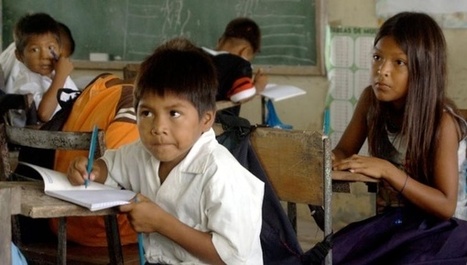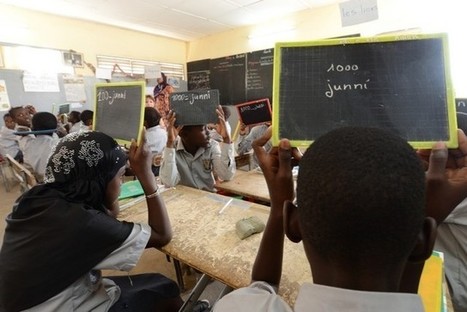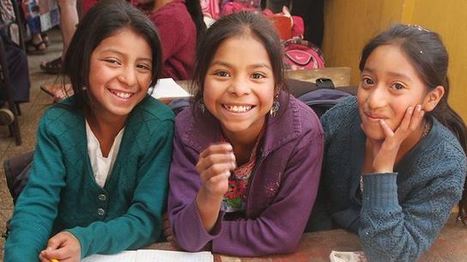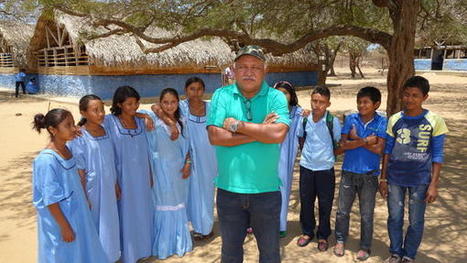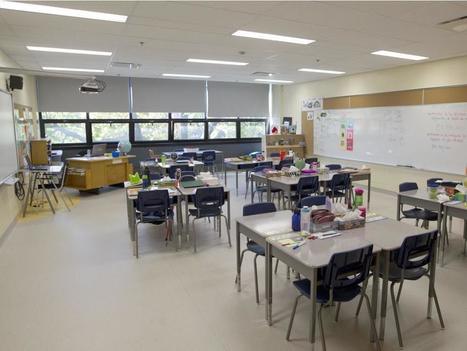 Your new post is loading...
Published by Marianas Variety, IAugust 5, 2015
MAJURO — Beset with ongoing low academic results in its public schools, the Marshall Islands announced a “bold” change to its public school teaching strategy at the recent Pacific Educational Conference held here.
Published by Radio New Zealand, August 2, 2015
The Marshall Islands has announced what it calls a bold change to its public school teaching strategy, extending bilingual education through to the 12th grade.
Published by Telesur, May 18, 2015
Intercultural education is key for Panama's indigenous peoples, such as the Ngäbe-Buglé, to pass their culture to their children.
Indigenous communities in Panama reaffirmed their movement to reclaim their right to intercultural education Monday, pledging to ensure children in the first three grades of primary school in indigenous regions are taught by their own indigenous educators, Prensa Latina reported.
“We are not opposed to Latinos teaching our children,” said indigenous Ngabe-Bugle attorney Alberto Montezuma. “What we have always claimed is that at these levels, including preschool, the teachers must be indigenous so that our children have a bilingual education.”
The Panamanian government promised intercultural education for its indigenous administrative zones in 2010, but the model was never implemented, according to Panama’s La Estrella, despite the World Bank directing US$4.5 million to the Ministry of Education for the project.
Numbers of indigenous teachers top out at 10 percent of all educators in the heart of indigenous territories, with the much lower numbers on the peripheries of indigenous regions.
Published by The National, May 5, 2014
The programme helps children, most of whom speak a local language, learn in French, the official language of Senegal.
Published by Murciatoday, April 13, 2015
English And Spanish Bilingual Education Spreads Throughout Murcia.
Published by the Northumberland News, April 1`, 2015 Indigenous people struggle to study in native language

|
Scooped by
Dual Language Education of New Mexico
February 22, 2015 11:50 PM
|
Published by the South China Morning Post, February 23, 2015
Published by EnglishEastday.com, January, 2015
Thomas Friedman's proposition that the world is flat came true for Delaware students when the governor signed on to an overseas study program with a Chinese company.
Governor Jack Markell announced a China summer abroad program for high school students studying Mandarin earlier this month, signing an agreement with Wanxiang Group, China's leading auto parts manufacturer, for students to study at the company's facility in Hangzhou, China.
"Graduates who enter the job market without the ability to speak a world language other than English are at a significant disadvantage," said Markell. "And there is no better way to become immersed in another language and culture than to live it."
It is not a one-time action for Delaware.
To equip Delaware's students with trans-cultural skills in the global economy competition, Markell put his ideal of shaping "the most bilingual state" into statewide practice with the World Language Expansion initiative in 2012.
"World language capacity is crucial to Delaware in order for the state to maintain and strengthen its domestic economy," Markell wrote in a state document, proposing a robust language education plan starting at early ages
.

|
Scooped by
Dual Language Education of New Mexico
January 11, 2015 12:52 PM
|
Published by The New Zealand Herald, January 15, 2015
New Zealand's monolingualism could inhibit our chances of becoming a more globally responsive nation, according to AUT's Associate Professor Sharon Harvey.
Despite more than 160 languages being spoken in New Zealand, our public institutions continue to conduct their affairs mostly in English; Harvey, AUT's head of the School of Language and Culture, says lack of a coherent national policy means harnessing language strengths are not part of strategic planning at any level in New Zealand.
She believes that the globalised nature of contemporary society means multilingualism is of greater social, cultural or economical value than ever before.
"It helps us stand in the shoes of the other, to develop international competency and to operate effectively in a global society," she says.
Harvey says young people overseas are learning two and more languages: "Why are we short-changing New Zealand young people? Ideally, New Zealand students should be leaving secondary school with high level achievement in Maori, English and one other language. In as many cases as possible, one of these languages should be a students' home language."
Published by Ynet news.com, January 2, 2015
The Hand in Hand bilingual schools teach two languages, two cultures, and three religions – Judaism, Christianity and Islam. Each classroom has two teachers, one who teaches in Hebrew and the other in Arabic.

|
Scooped by
Dual Language Education of New Mexico
November 25, 2014 7:44 PM
|
Published by the Telegraph, November 20, 2014
"To have another language is to possess a second soul." So said Charlemagne.
In Remembrance season, the increase in popularity of nationalist parties across Europe is a timely reminder that we must always be on guard as history can and often does repeat itself.
As a language teacher, it worries me deeply to see that with less than a third of state secondary schools running exchange trips and only 48 per cent of 16 year olds in England taking a modern foreign language at GCSE, the majority of the next generation will be dispossessed of that "second soul".

|
Scooped by
Dual Language Education of New Mexico
November 24, 2014 8:43 AM
|
Published by the Language Magazine, November, 2014The British government, in recognition of the value of language learning in early childhood, took a bold step this year and mandated compulsory teaching of a second language for children ages seven to eleven in English primary [elementary] schools. As of this September, all primary school students are required to study one of seven languages, and though the most popular choice is French, followed by Spanish, some schools offer Mandarin and Arabic. Many believe that this move is essential for the UK to remain competitive with its European counterparts. This is clearly a commendable move, but is it an incredible advance or a wildly optimistic plan? How will the schools actually implement this, and is there support in place to see this plan comes to successful fruition?

|
Scooped by
Dual Language Education of New Mexico
November 7, 2014 12:13 PM
|
Published by Telesur, November 6, 2014
A new program in Bolivia will teach elementary school teachers to provide multilingual instruction to students in Spanish, a local indigenous language, and English.
Bolivia’s Minister of Education Roberto Aguilar says the idea is to foster an intercultural education model. “For a teacher who is trained in a monolingual context with a hispanicized understanding of things and a centralized approach, in this intercultural context their training must obviously be supplemented in the areas of language and culture in order to develop this historic objective we are working towards, which is the decolonization of education,” he said.
Many schools already provide multilingual education, and the government hopes that by institutionalizing the practice, students will graduate with better language skills for both within Bolivia and abroad.
|
Published by daynurseries.co.uk, August 4, 2015
UK’s first Mandarin-English bilingual nursery established to meet growing demand for second language learning in early years
Published by Del Peru para el mundo, Mary 28, 2015
Some 15,000 teachers will be hired by the Ministry of Education to assist the needs of public schools providing Intercultural Bilingual Education (EIB), in favor of 53 indigenous Peruvian communities, totaling over 1 million students.
Published by Shanghai Daily, May 11, 2015
Published by the Los Angeles Times, April 13, 2015
Not so many years ago, Wayuu customs such as palabreros were looked down upon by most Colombians, part of a condescending attitude in general toward native groups. But after decades of neglect, experts on the country's aboriginal cultures say, more respect finally is being paid.
For Colombia's native peoples, a watershed event was the 2010 enactment of the Language Law, which made preservation of the customs and languages of the Wayuu and the other native communities a national priority. The law was passed after warnings that up to half of the indigenous idioms in Colombia faced extinction unless measures were taken to preserve them.
Also in 2010, the tribal judges were recognized by the United Nations' cultural arm UNESCO as part of the world's cultural heritage, providing added impetus to tribal rights and the struggle for cultural preservation.
Opponents of planned Colombian dams take heart from OAS report
Opponents of planned Colombian dams take heart from OAS report
"Each native language gives a vision of the world, a way of perceiving and organizing things that we cannot afford to lose," said Olga Ardila, a linguistics professor at National University of Colombia in Bogota. "And there is also the social function of language, how it binds communities together."
Published by telesurtv, April 2, 2015
Published by A Channel NewsAsia, March 27, 2015
Minister of State for Education and Communications and Information Sim Ann says bilingualism was the late Mr Lee Kuan Yew's most bold, radical and controversial policy, but it has paid off.

|
Scooped by
Dual Language Education of New Mexico
February 19, 2015 8:15 AM
|
Published by Phys.org, February 2, 2015
New research by the University of Oxford shows that children classified as EAL (English as an Additional Language) usually catch up with their peers in their school attainment by the time they are 16.
Published by the South China Morning Post, January 26, 3-15
Two public schools have stepped up to the challenge of providing cost-effective options for bilingual learning
Published by the Montreal Gazette, January 7, 2015
Chris Eustace writes: "A fully bilingual Montreal education system would offer more opportunities for our youth by producing employable graduates which would help boost Quebec's stagnant economy." ... "In 2015, let’s put politics aside. The Ministry of Education should consider bilingual schools as an investment not only for Montreal, but also for Quebec."

|
Scooped by
Dual Language Education of New Mexico
December 7, 2014 10:55 AM
|
How can schools and communities better value and develop the skills of bilingual children? Our experts share their thoughts

|
Scooped by
Dual Language Education of New Mexico
November 24, 2014 8:57 AM
|
Published by MLive, November 19, 2014
Detroit Public Schools will further expand offerings to bilingual students and families.

|
Scooped by
Dual Language Education of New Mexico
November 12, 2014 6:19 AM
|
Published by the University of Cambridge, undated 2014
Research shows that children who speak more than one language have an advantage over their monolingual playmates when it comes to communication, understanding and social interaction. But the benefits go even further if children can be encouraged to take a formal qualification, such as a GCSE, as this short film describes.
In England, 14% of secondary school pupils – that’s about 400,000 – speak a language other than English as their first language. In English primary schools, one in six children don’t have English as a first language. Together this amounts to about 1 million children throughout the school system.
The Cambridge Bilingualism Network was set up in 2010 by Cambridge researchers to promote the public understanding of bilingualism through their work with schools and communities.
This short film was made as part of their activities. It features a group of multilingual students who describe the advantages of speaking more than one language and of having a qualification to show for it. This is a view shared in the film by Cambridge’s Vice-Chancellor, Professor Sir Leszek Borysiewicz, who was born in Wales to Polish parents.
"Research shows that children who speak more than one language have a considerable advantage over their monolingual playmates when it comes to communication, understanding and social interaction," explained Dr Dora Alexopoulou, researcher at the Department of Theoretical and Applied Linguistics at the University of Cambridge. "However, what we are finding is that it’s very common that kids don’t learn to read and write their language and therefore their linguistic skills do not develop fully. They kind of stall at some point and that puts a serious limitation on the range of situations in which they can use their languages."
Although many schools provide the support needed for students to take a formal qualification, the results of school census data suggest that only around half of pupils take a GCSE in their mother tongue. For some languages, including those in the 20 most common languages in the UK like Somali, Lithuanian and Filipino, there is currently no GCSE qualification on offer.
|



 Your new post is loading...
Your new post is loading...




